Fleurs du Mal Magazine


Or see the index

freda kamphuis
boven nietzsche
• fleursdumal.nl magazine
More in: Archive K-L, Freda Kamphuis, Freda Kamphuis, Friedrich Nietzsche, Galerie Deutschland, Photography

freda kamphuis
the bearable lightness of being
• fleursdumal.nl magazine
More in: Archive K-L, Freda Kamphuis, Freda Kamphuis, Kamphuis, Freda, Natural history, Photography, Surrealisme
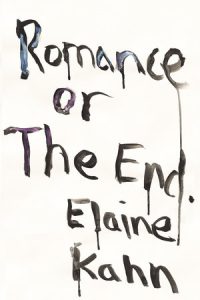 “This book takes me right back to the Carnage Years―yours, too―sacrificed to love. If only I, you, had possessed Elaine Kahn’s wisdom and wit. These poems are lacerating, coy, bloody, and so true I wanted to memorize lines from them.”
“This book takes me right back to the Carnage Years―yours, too―sacrificed to love. If only I, you, had possessed Elaine Kahn’s wisdom and wit. These poems are lacerating, coy, bloody, and so true I wanted to memorize lines from them.”
Rachel Kushner, author of The Mars Room and The Flamethrowers
Romance or The End takes up the tools of romantic narrative in order to perform the rupture between self and story that occurs at the onset of trauma.
Using known and pathologized literary arcs, Elaine Kahn unspools the fundamental instability of truth, love, and language to create an experiential portrait of narrative’s power to both disfigure and restore.
This is a book about love.
And it is a book about lies.
Love can be a lie, but it is also always true.
This is a book about truth.
This is a book about story.
There is no such thing as a true story and so there are no stories in this book.
Without a story, there is separation.
This is a book about separation.
Everything is a story. Even the truth.
There is nothing truer in this world than the lie of love.
Elaine Kahn is the author of Women in Public (City Lights, 2015), as well as several chapbooks including I Told You I Was Sick: A Romance (After Hours, Ltd., 2017), A Voluptuous Dream During An Eclipse (Poor Claudia, 2012) and Customer (Ecstatic Peace! Library, 2010). Her writing has appeared in Frieze, Brooklyn Rail, Jubilat, Poetry Foundation, Art Papers, and elsewhere. She received an MFA from the Iowa Writers’ Workshop, and teaches at Pomona College and the Poetry Field School. She lives in Los Angeles, CA.
Romance or the End
By Elaine Kahn
Category: Poetry
Publisher: Soft Skull
February 2020
Language: English
Paperback
144 pages
ISBN-10: 1593765843
ISBN-13: 978-1593765842
Price: $16.00
• fleursdumal.nl magazine
More in: #Editors Choice Archiv, - Book News, - Bookstores, Archive K-L, Archive K-L
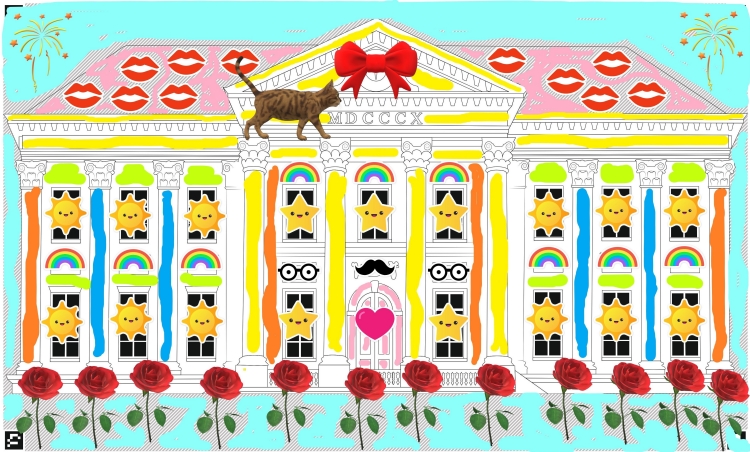
freda kamphuis
funhouse
• fleursdumal.nl magazine
More in: Archive K-L, Dutch Landscapes, Freda Kamphuis, Freda Kamphuis, Photography
Inspiring oral histories of women fighting for justice and radical social change at community, state, and national levels.
 Award-winning oral historian Lynn Lewis brings together the stories of nine exceptional women, from their earliest formative experiences to their current strategies as movement leaders, organizers, and cultural workers.
Award-winning oral historian Lynn Lewis brings together the stories of nine exceptional women, from their earliest formative experiences to their current strategies as movement leaders, organizers, and cultural workers.
Each chapter is dedicated to one activist—Malkia Devich-Cyril, Priscilla Gonzalez, Terese Howard, Hilary Moore, Vanessa Nosie, Roz Pelles, Loretta Ross, Yomara Velez, and Betty Yu.
Reflecting upon the path their lives have taken, they talk about their struggles and aspirations, insights and victories, and what keeps them in the fight for a better world.
The life stories of these inspiring women reveal the many ways the experience of injustice can catalyze resistance and a commitment to making change. They demonstrate how the relationships and bonds of collective struggle for the common good not only win justice, but create hope, love, and joy.
Lynn Lewis (editor) is an oral historian, educator, and community organizer. She is the author of Love and Collective Resistance: Lessons from the Picture the Homeless Oral History Project and is the former executive director and past civil rights organizer at Picture the Homeless. Lewis is the recipient of many honors and awards, including a 2022/2023 National Endowment for the Humanities Oral History Fellowship. She lives in New York City.
Women Who Change the World:
Stories from the Fight for Social Justice
by Lynn Lewis (Editor)
ISBN-13: 9780872868748
Publisher: City Lights Books
Series: City Lights Open Media
Publication date: 08/29/2023
Pages: 280
Paperback
$17.95
• fleursdumal.nl magazine
More in: - Book News, - Bookstores, Archive K-L, AUDIO, CINEMA, RADIO & TV, Black Lives Matter, Feminism, Racism, Workers of the World
Beautiful in the Mouth was selected by Thomas Lux as winner of BOA’s A. Poulin, Jr., Poetry Prize and it debuted in the top ten on the Poetry Foundation bestseller list.
 In it, Kuipers combines frank sensuality with sincere emotion, yielding poems that travel from New York City to the American West on a exploration of love and loss.
In it, Kuipers combines frank sensuality with sincere emotion, yielding poems that travel from New York City to the American West on a exploration of love and loss.
Set against both literal and figurative geography—the empty bedroom of a dead child, a clear-cut hillside outside a logging town—these poems examine how loss transforms our most unwilling landscapes.
Thomas Lux selected this debut collection as winner of BOA’s A. Poulin, Jr., Poetry Prize.
In his foreword he writes, “I was immediately struck by the boldness of imagination, the strange cadences, and wild music of these poems.
We should be glad that young poets like Keetje Kuipers are making their voices heard not by tearing up the old language but by making the old language new.”
Keetje Kuipers, a native of the Northwest, earned her BA at Swarthmore College and MFA at the University of Oregon. A Stegner Fellow at Stanford University, she divides her time between Stanford and Missoula, Montana.
Beautiful in the Mouth
(A. Poulin, Jr. New Poets of America)
by Keetje Kuipers (Author),
Thomas Lux (Foreword)
Paperback
2010
Publisher: BOA Editions Ltd.; First Edition (April 1, 2010)
Language: English
Paperback: 96 pages
ISBN-10: 1934414336
ISBN-13: 978-1934414330
$17.00
• fleursdumal.nl magazine
More in: #Modern Poetry Archive, - Book News, - Bookstores, Archive K-L, Archive K-L, Kuipers, Keetje
One of Library Journal’s “Thirty Amazing Poetry Titles for Spring 2014,” The Keys to the Jail asks the question of who is to blame for all we’ve lost, calling us to reexamine the harsh words of failed love, the aging of a once-beautiful body, even our own voracious desires.
 With daring leaps and unflinching observations, these richly textured lyrics travel from Montana’s great wildernesses to the ocean-fogged streets of San Francisco as they search out the heart that’s lost its way.
With daring leaps and unflinching observations, these richly textured lyrics travel from Montana’s great wildernesses to the ocean-fogged streets of San Francisco as they search out the heart that’s lost its way.
The Keys to the Jail asks the question of who is to blame for all we’ve lost, calling us to reexamine the harsh words of failed love, the aging of a once-beautiful body, even our own voracious desires.
Keetje Kuipers is a poet of daring leaps and unflinching observations, whose richly textured lyrics travel from Montana’s great wildernesses to the ocean-fogged streets of San Francisco as they search out the heart that’s lost its way.
(. . .) Shirtless
in the phosphorescent gloom of streetlamps,
they lie suspended. This is my one good
life—watching the exchange of embraces,
counting the faces assembled outside
the ice-cream shop, sweet tinge of urine by
the bridge above the tracks, broken bike lock
of the gay couple’s hands, desperate clapping
of dark pigeons—who will take it from me?
(. . .)
Dolores Park (fragment)
A former Wallace Stegner Fellow in Poetry, Keetje Kuipers’s debut collection, Beautiful in the Mouth, won the A. Poulin, Jr. Poetry Prize. She has been the Margery Davis Boyden Wilderness Writing Resident, and is currently an assistant professor at Auburn University.
Keetje Kuipers is a native of the Northwest. She earned her B.A. at Swarthmore College and her M.F.A. at the University of Oregon. She has been the recipient of a number of fellowships, including those from the Vermont Studio Center, Squaw Valley Community of Writers, and Oregon Literary Arts.
In 2007 Keetje completed her tenure as the Margery Davis Boyden Wilderness Writing Resident, which provided her with seven months of solitude in Oregon’s Rogue River Valley. She used her time there to complete work on her book, Beautiful in the Mouth, which was awarded the 2009 A. Poulin, Jr. Poetry Prize and was published in 2010 by BOA Editions. It contains poems previously published in Prairie Schooner, West Branch, Willow Springs, and AGNI, among others. You can also listen to her read her work—which has been nominated seven years in a row for the Pushcart Prize—at the online audio archive From the Fishouse. Keetje’s second book, The Keys to the Jail, is forthcoming from BOA Editions in the spring of 2014, and contains poems previously published in American Poetry Review, Jubilat, and the Indiana Review.
Keetje Kuipers was a Wallace Stegner Fellow at Stanford University from 2009-2011, and she was the Emerging Writing Lecturer at Gettysburg College from 2011-2012. Currently she is an Assistant Professor at Auburn University where she lives with her family and their dog, Bishop (named after Elizabeth, of course).
Keetje Kuipers
Title: The Keys to the Jail
Poems
Publisher: BOA Editions Ltd.
2014
Language: English
Paperback
96 pages
ISBN-10: 1938160266
ISBN-13: 978-1938160264
$17.00
• fleursdumal.nl magazine
More in: #Modern Poetry Archive, - Book News, - Bookstores, Archive K-L, Archive K-L, Kuipers, Keetje
De poëzie van Ruth Lasters is aards, wil aards zijn.
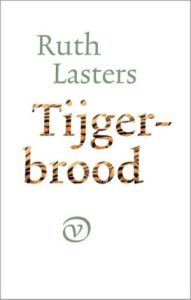 In een weloverwogen syntaxis, met een voorkeur voor het onverwachte perspectief en een warm hart voor de zwakkeren, componeert ze versbeelden die afwijkend zijn en energiek, muzikaal en beeldend.
In een weloverwogen syntaxis, met een voorkeur voor het onverwachte perspectief en een warm hart voor de zwakkeren, componeert ze versbeelden die afwijkend zijn en energiek, muzikaal en beeldend.
Tijgerbrood gaat over het verlangen om voor altijd toevlucht te kunnen zoeken, op te lossen in pure vorm, in woordenloosheid. De auteur is haar vroegere compartimenten kwijt.
De dichter, leerkracht, kindervrije vrouw, partner, pacifist, klimaattobber en kunstliefhebber werden samengekneed tot één wezen dat haar hoop, bekommernissen en angsten meer en meer durft te erkennen als die van iedereen.
Als brood leven is, zoals men zegt, is tijgerbrood een leven in camouflagevel om als observator ongehinderd de stem te kunnen opvangen van de hele maatschappij.
Auteur(s) : Ruth Lasters
Uitgeverij: Uitgeverij G.A. Van Oorschot
ISBN: 9789028231030
Taal: Nederlands
Uitvoering: Paperback
Aantal pagina’s: 80
Verschijningsdatum: februari 2023
Afmetingen: 220 x 140 x 10 mm.
Paperback 19.50
• fleursdumal.nl magazine
More in: #Editors Choice Archiv, - Book News, - Bookstores, Archive K-L, Archive K-L
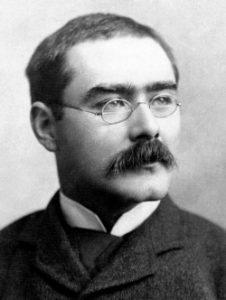
The City of Sleep
Over the edge of the purple down,
Where the single lamplight gleams,
Know ye the road to the Merciful Town
That is hard by the Sea of Dreams –
Where the poor may lay their wrongs away,
And the sick may forget to weep?
But we – pity us! Oh, pity us!
We wakeful; ah, pity us! –
We must go back with Policeman Day –
Back from the City of Sleep!
Weary they turn from the scroll and crown,
Fetter and prayer and plough –
They that go up to the Merciful Town,
For her gates are closing now.
It is their right in the Baths of Night
Body and soul to steep,
But we – pity us! ah, pity us!
We wakeful; oh, pity us! –
We must go back with Policeman Day –
Back from the City of Sleep!
Over the edge of the purple down,
Ere the tender dreams begin,
Look – we may look – at the Merciful Town,
But we may not enter in!
Outcasts all, from her guarded wall
Back to our watch we creep:
We – pity us! ah, pity us!
We wakeful; ah, pity us! –
We that go back with Policeman Day –
Back from the City of Sleep!
Rudyard Kipling
(1865 – 1936)
The City of Sleep
• fleursdumal.nl magazine
More in: Archive K-L, Archive K-L, Kipling, Rudyard
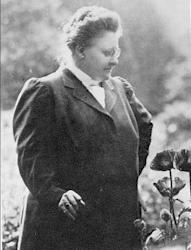
The Weather-Cock Points South
I put your leaves aside,
One by one:
The stiff, broad outer leaves;
The smaller ones,
Pleasant to touch, veined with purple;
The glazed inner leaves.
One by one
I parted you from your leaves,
Until you stood up like a white flower
Swaying slightly in the evening wind.
White flower,
Flower of wax, of jade, of unstreaked agate;
Flower with surfaces of ice,
With shadows faintly crimson.
Where in all the garden is there such a flower?
The stars crowd through the lilac leaves
To look at you.
The low moon brightens you with silver.
The bud is more than the calyx.
There is nothing to equal a white bud,
Of no colour, and of all,
Burnished by moonlight,
Thrust upon by a softly-winging wind.
Amy Lowell
(1874-1925)
The Weather-Cock Points South
• fleursdumal.nl magazine
More in: Archive K-L, Archive K-L, Lowell, Amy

If—
If you can keep your head when all about you
Are losing theirs and blaming it on you,
If you can trust yourself when all men doubt you,
But make allowance for their doubting too;
If you can wait and not be tired by waiting,
Or being lied about, don’t deal in lies,
Or being hated, don’t give way to hating,
And yet don’t look too good, nor talk too wise:
If you can dream—and not make dreams your master;
If you can think—and not make thoughts your aim;
If you can meet with Triumph and Disaster
And treat those two impostors just the same;
If you can bear to hear the truth you’ve spoken
Twisted by knaves to make a trap for fools,
Or watch the things you gave your life to, broken,
And stoop and build ’em up with worn-out tools:
If you can make one heap of all your winnings
And risk it on one turn of pitch-and-toss,
And lose, and start again at your beginnings
And never breathe a word about your loss;
If you can force your heart and nerve and sinew
To serve your turn long after they are gone,
And so hold on when there is nothing in you
Except the Will which says to them: ‘Hold on!’
If you can talk with crowds and keep your virtue,
Or walk with Kings—nor lose the common touch,
If neither foes nor loving friends can hurt you,
If all men count with you, but none too much;
If you can fill the unforgiving minute
With sixty seconds’ worth of distance run,
Yours is the Earth and everything that’s in it,
And—which is more—you’ll be a Man, my son!
Rudyard Kipling
(1865 – 1936)
If
• fleursdumal.nl magazine
More in: Archive K-L, Archive K-L, Kipling, Rudyard
The only book of poetry to date devoted to the Rwanda genocide and published in this country, this is a work of nonfictional poetry, a cousin in genre to the nonfictional novel.
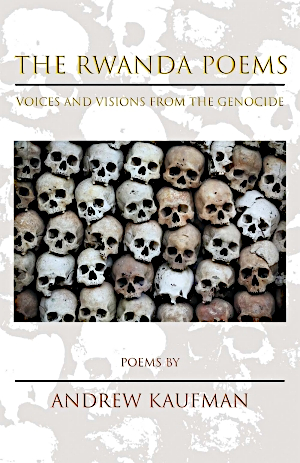 It is based not only on the poet’s observations and encounters during months spent in post-genocide Rwanda, but on his numerous extensive interviews with survivors, all of whom lost most if not all of their families, and with convicted genocide perpetrators, conducted in prisons.
It is based not only on the poet’s observations and encounters during months spent in post-genocide Rwanda, but on his numerous extensive interviews with survivors, all of whom lost most if not all of their families, and with convicted genocide perpetrators, conducted in prisons.
The result is a startling book of poems that by turns is unthinkably horrifying, heartbreaking, and enraging, yet which at times breaks unexpectedly into stunning revelatory moments of grace.
As a poetry of witness this book reveals what it is like to carry on with daily life in a society where nearly every adult male is either a genocide survivor or perpetrator, almost every woman either a survivor or the wife of a perpetrator, and where nearly every child at the time of the genocide witnessed multiple killings, often of immediate family members.
Ranging from free verse to stanzaic forms, this book by an NEA-award-winning poet uses tools and methods of poetry to distil each of its many varied voices to its essence, allowing those who are heard in these poems to speak for themselves, often in juxtapositions that lend the book the structure and tension of a drama. Considered more broadly, The Rwanda Poems is a book about the extremities of evil that the human psyche is capable of enduring and inflicting, and the resulting psychic costs to survivors and perpetrators.
Andrew Kaufman‘s books include Earth’s Ends, winner of the Pearl Poetry Prize, The Cinnamon Bay Sonnets, winner of the Center for Book Arts book award, Both Sides of the Niger (Spuyten Duyvil Press), and the COMPLETE CINNAMON BAY SONNETS (Rain Mountain Press). The time he spent in Rwanda was made possible in part by an NEA grant. He has taught literature and writing at a number of colleges and universities, and resides in New York City.
The Rwanda Poems
Voices and Visions from the Genocide
by Andrew Kaufman
Language: English
Publisher: NYQ Books
10 Mar. 2023
Product Number:9781630450816
ISBN-10: 1630450812
ISBN-13: 978-1630450816
Pages:110
Paperback
£12.13
• fleursdumal.nl magazine
More in: #Editors Choice Archiv, - Book News, - Bookstores, Archive K-L, Archive K-L
Thank you for reading Fleurs du Mal - magazine for art & literature